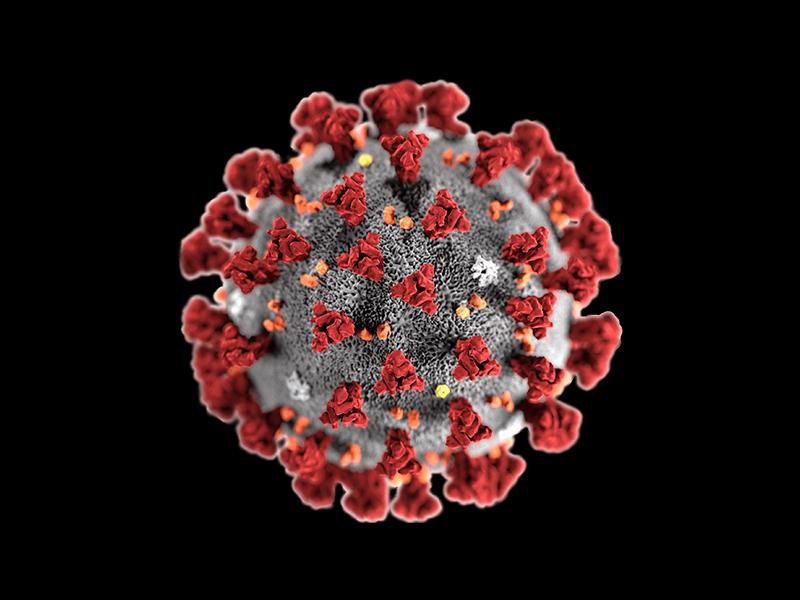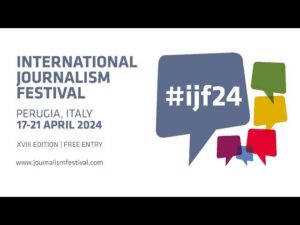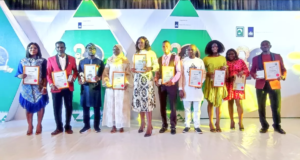Since the COVID-19 pandemic broke out, the media has expectedly remained one of the major channels to reach the people, share accurate information, find out what people need to know and report about the impact on the society.
This crucial role becomes more important considering that COVID19 is not only a pandemic, but the kind which most people alive today have not experienced and scientists are still battling to find a cure as the rate of infection keeps rising globally and more people are dying of it. The kind of this pandemic occurred in 1918
Journalists therefore not find it easy reporting the virus which is new to everyone, including medical experts trying to understand it.
This was the basis for the webinar series hosted by the United States Consulate General in Nigeria with the theme “How To Report On COVID19″. The three-part series was to enlighten and orientate journalists on several ways to report the COVID19 pandemic.
Adesola Ikulajolu who was one of the participants provides a comprehensive report on the insights shared at the first session.
In her address, the Deputy Chief of Mission, Kathleen FitzGibbons advised media organisations to think of the role they want to play in reporting the pandemic and have the knowledge of what works as well as figuring out how COVID19 can be curtailed.
She highlighted the role of the media in the fight against the pandemic and reasons to reach the people in local communities beyond the urban centres.
FitzGibbons advised journalists and media organisations not to give up in the fight against the virus even as several criticisms keep coming, but to keep reporting the truth.
She noted that all journalists at this period are “disease-fighters”, pointing out that when Ebola virus broke out, it was easy to control even as rigid as it was. While everyone could easily identify the symptoms of Ebola, that of Coronavirus according to her is not so.
In her words, journalists need to “understand the phases of the virus. There was the first phase, the wildfire is out and the numbers are increasing.”
She said journalists need to report stories that will help the people understand the dire situation the world is confronted with. For those who are still doubting the existence of the virus, journalists must make sure they understand that the virus is real and should pass the information to the public.
She enjoined journalists to play their part at this crucial period in the world and “Remember you are translating the science to the public.”
READ ALSO: COVID-19: Best practices for investigative reporting in Africa.
The guest facilitator was Sarah Watcher, Award-winning American journalist who covered the Ebola outbreak in Liberia and Congo. She has written for The New York Times, The International Herald Tribune, The Economist, Economist Intelligence Unit, and produced for the BBC.
Speaking on Sourcing and Fact-Checking, Watcher quoted the UN Economic Mission For Africa which states that: “Africa could see from 300,000 to 3.3 million lives lost to COVID-19”.
Three Principles For Covering COVID19 according to her are as follows:
-Uncertainty – its early days and little is known about the virus’ spread in African countries. Scientists are trying to understand the virus and how it works.
-Fast-evolving story – you need to keep up! You need to know any new side of the virus.
-A dose of healthy scepticism (on cures, virus origins, medical research.) “We will need several vaccines for the pandemic… Not just one or two”- to serve the world’s population. You should have a good understanding of the virus.” she said.
According to the health journalist, “The earliest a vaccine was discovered was for measles was four years. A vaccine was never found for HIV/AIDS. Today more than 100 teams are working on a vaccine.”
She noted that others are looking at a treatment combination of anti-viral, anti-inflammatory, and immuno-suppressant medications, while the “supply chain issues (lack of materials, the daunting task of distribution) will further delay uptake of any possible vaccine.”
How To Source For Story
-Your health reporting should rely only on professionals with deep expertise from respected institutions. Due to social media, much dis-information is circulating, and rogue and provocative scientists are getting unmerited credence to their flimsy research.
-Follow Health Reporting Warning. Some of the examples on this was when French research released a study saying hydroxychloroquine could be effective against Covid-19 and the study was tiny and poorly designed. A bigger research paper in the Lancet later showed the drug could increase the risk of death. Many scientists criticized the Lancet information. On the final side, the WHO has stopped clinical trials on these drugs.
-Be factual and verify your numbers. Remember, reporting on health has life-or-death consequences and wrong decimal point or an extra zero can be fatal. Verify and check your facts and numbers at least twice, if not three times. Have your source double-check your copy.
-Get information from experts on the front line. Some of these frontlines include:
Health statisticians,
Epidemiologists,
Doctors and other health care workers in emergency medicine treating COVID-19 patients’ in-country,
Medical researchers and academics studying the virus – virologists, infectious disease specialists, clinical researchers, public health specialists, data scientists, teaching hospitals, medical schools, immunologists
Subspecialties on the disease’s impact: vascular specialists, pulmonologists, nephrologists (kidney), cardiologists, paediatricians, bioethicists.
You should also consider a combination of clinical observations and research. And it is necessary to understand how the virus spreads even in other countries/continents.
Tip To Cover COVID19
COVID19 is a new virus and it comes with its own sensitivity regarding reporting it. Here are some of the tips by Watcher who has covered several disease-related stories.
-Stick to medical experts with deep expertise at the world’s most respected institutions and firms
-Don’t interview an expert without verifying their professional background and experience at their official websites. Do not rely on a single social media source as a resource
-Identify experts at international institutions. Look for international experts with deep experience in Africa and Nigeria within these institutions in these – start with their local office:
CDC Africa – a wide range of experts
WHO – a wide range of experts (African Vaccine Regulatory Forum)
GLOBAL NGOS: Doctors Without Borders (clinical expertise), Oxfam Pan-African Programme
-INTERVIEW WITH GLOBAL TOOLS: WhatsApp, FaceTime, Zoom, Skype
-Get experts on data and vaccines.
FOUNDATIONS: Gates Foundation (Africa Director (Nairobi), Oumar Seydi), deepening work in Nigeria
BIG PHARMA (Johnson & Johnson, Sanofi, Astra Zeneca, etc.) are the main actors working on vaccines.
-Get Public Health Sources. Some of the best Public Health Schools in the World where you can get accurate health information include Johns Hopkins University, Harvard University, University of North Carolina Chapel Hill, Columbia University, University of Michigan Ann Arbor, University of Washington, Boston University.
– Reach out to Ebola experts, HIV/AIDS experts and NGOs. Some of them include Dr. Jerry Brown, Medical Director, Eternal Love Winning Africa; Experts across the spectrum of lessons learned from Ebola (community health worker network in Sierre Leone); GAVI; Former heads of Ebola task forces.
-Engage Development Banks investing in COVID19. The highest money towards the fight of COVID19 is coming from the West/Europe. Some include African Development Bank (AFDB) Nigeria office, Ecofin, DFID, KfW, among others.
– Get Continental Sources. Some of the sources include African Academy of Sciences, Dr. Moses Alobo, COVID-19 Response Committee; Scientists in Africa; African Epidemiology Association; European, Developing Countries Clinical Trials Partnership for COVID-19 (EU funded); NEPAD, with Wellcome Trust UK funding.
Watcher also highlighted some of the homegrown sources to get information. They include Nigerian Institute for Medical Research, (Centre for Human Virology and Genomics); African Centre of Excellence for the Genomics of Infectious Disease, Redeemer University; Biosafety3 lab for highly infectious pathogens; Nigeria Centre for Disease Control; Coalition Against COVID-19 (private sector initiative); Aliko Dangote Foundation 54Gene Covid-19 Mobile (testing) Lab; Royal College of Pathologists.
It is worth noting that Nigeria scientists reported the first gene sequencing of SARS CoV-2 in Africa.
How To Find Your Sources
Knowing your source is one thing, knowing how to find them is another essential part:
-With paywalls dropped on Coronavirus coverage, you have access to a rich resource of reporting. The experts interviewed in these articles on the subjects you are reporting are a good place to start.
-Check publications to study.
-When you conduct interviews for/with experts; remember to ask who else you should speak with, what else you should know and what other questions you can ask.
-Remember the “rule of three’s – you must speak to AT LEAST THREE SOURCES for every article, to get a range of perspectives.”
-Create a WhatsApp group to share sources willing to speak on the record to journalists. That’s what journalists in Ghana did during the Ebola crisis.
Responding to a question on how journalists can ascertain true information on research carried out, the facilitator said journalists should have experts to speak on the research and as well understand the true nature of the virus.
On Fact-checking, Watcher said that one key role of the journalists at this period is to be a debunker of myth noting that we are in an era of disinformation.
She maintained that “infodemic” is another form of the pandemic that is hitting hard on the public.
According to UNESCO COVID SURVEY:
-One-third of social media users are aware of reading fake information
-Two out of five posts on COVID-19 pass along unreliable information
-42% of Tweets on COVID come from bots
-40% of COVID posts needed a warning
Top 10 COVID19 Myths
According to Jeune Afrique, some of the myths about COVID19 are: Mosquitoes; Useless remedies (antibiotics, hydroxychloroquine); Fantastic remedies (sesame oil rubbed on your body, child’s urine, herbal remedies); Packages from China; Children are immune; Conspiracy by Big Pharma; Biological weapon; 5G; A conspiracy (to take down a famous person). Some of these myths have gone global and the public is being made to believe it.
He referred to a viral video on misinformation about COVID19- the 26-minute video of unsubstantiated claims removed by Facebook and Google, hashtag #Plandemicmovie was blocked, short clips remain on Twitter. The edited versions lingered on YouTube and millions of people have seen it and sharing it widely by WhatsApp and other means
Watcher said “once disinformation is in wide circulation, no matter attempts to remove it, it lives on and on and embeds into the thinking of those who view or read it,” adding that to prevent misinformation, journalists should not publish information that is not verified
“If, after a news search, you see nothing written about it in a trustworthy publication, do not publish until you verify with the scientific source,” Watcher added. Journalists should also not use exaggerated language, inflammatory language that incites hate and fear.
How To Correct Misinformation
There are several things journalists can do to correct misinformation during this COVID19 pandemic. Watcher cited Harvard Kennedy School Misinformation Review:
-Focus on the TRUTH, rather than detailing misleading claims, such as tropical climates with lots of sunshine do not have lower chances of coronavirus spreading. Focusing too much on the rumour gives it credibility
-As a part of the mainstream media, do not give attention unnecessarily to crackpot ideas circulating on disreputable sites, this could lend these ideas legitimacy (this is a strategy!)
Watcher also advised journalists to hold government accountable and always get sources to back up interviews, adding that whatever the cure might be, journalists must provide the public with information.
On how American newspaper, New York Times was able to publish names of 1,000 victims of COVID19 in their country while African countries like Nigeria cannot achieve such feat, Watcher explained that cultural sensitivity is what makes the difference.
She explained that there is a “Death Notice” which is always published in US and made public in all regions of the country once a person dies. It contains the names and other information about the deceased person. This made it easy for the New York Times to get details of the deceased, but this might not be obtainable in other countries (especially Africa).
Watcher noted that the role of journalists is crucial at this time and it is necessary to continue to provide information that will help fight the virus and save the people (even as the numbers are increasing).
ADESOLA IKULAJOLU is an award-winning student journalist and the President of Mass Communication, Adekunle Ajasin University, Akungba-Akoko.
He can be reached via ikulajoluadesola@gmail.com, follow @oloyenaija1.






How virtual training shaped COVID-19 reporting in Nigeria - Nigeria Health Watch
[…] continued to help me and have improved my skills,” Adesola Ikulajolu, who offered journalists tips on COVID-19 reporting, said. He is a freelance journalist and President of National Association of Mass Communication […]
How virtual training shaped COVID-19 reporting in Nigeria - FUNKODE
[…] continued to help me and have improved my skills,” Adesola Ikulajolu, who offered journalists tips on COVID-19 reporting, said. He is a freelance journalist and President of National Association of Mass Communication […]